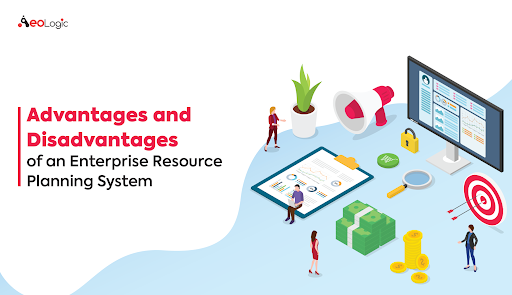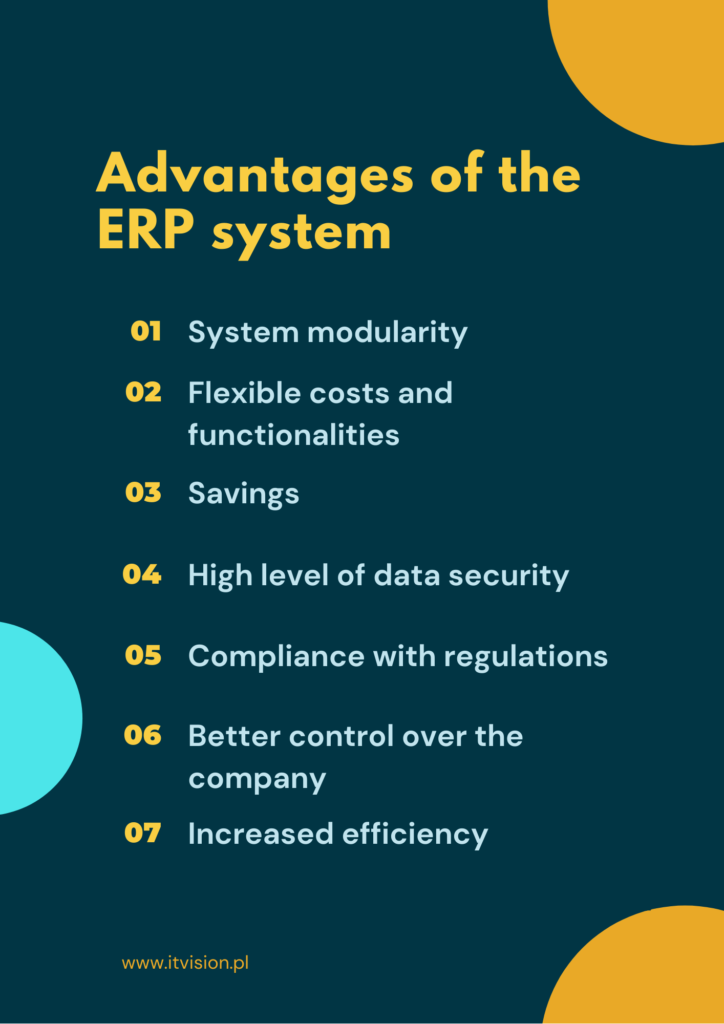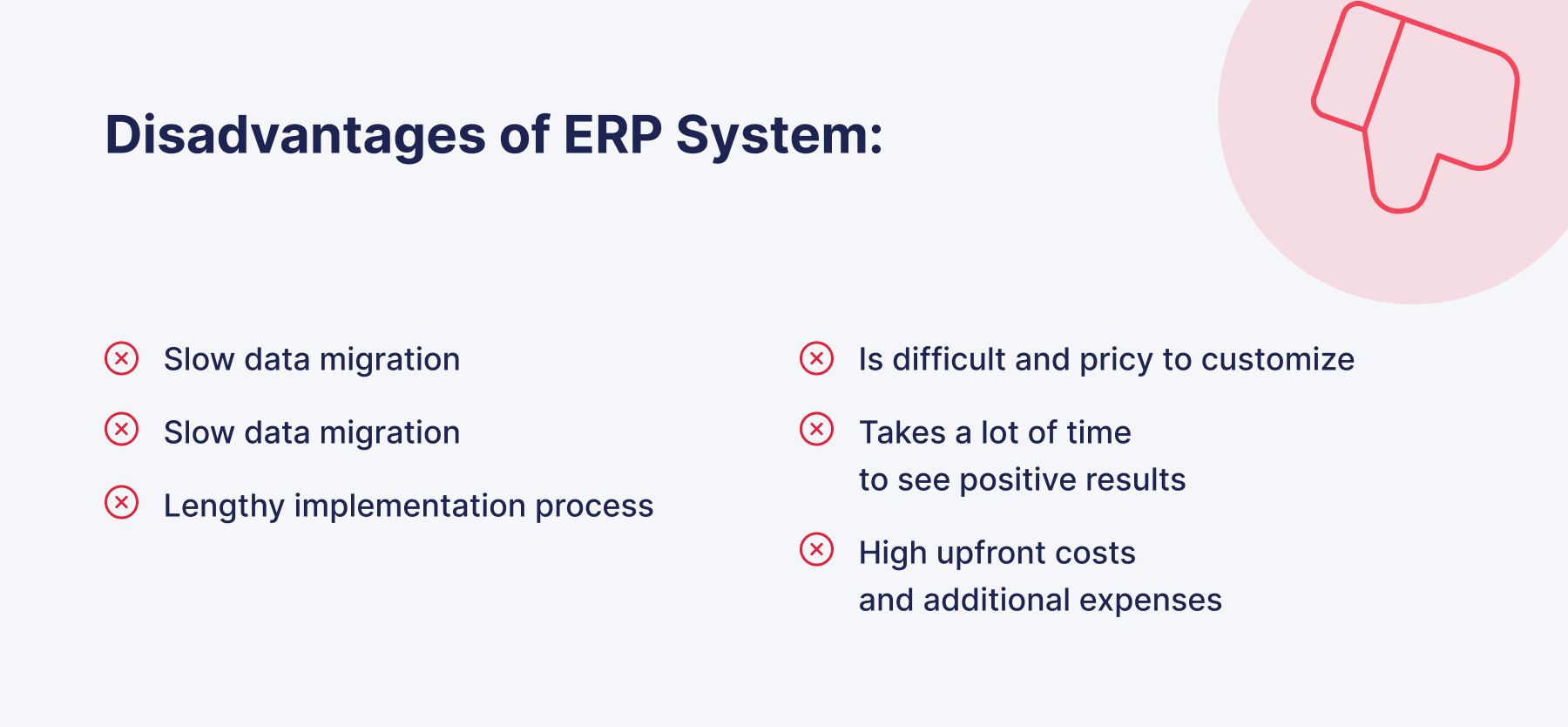An ERP system can streamline business operations. But, it also has its challenges.
Table of Contents
ToggleERP, or Enterprise Resource Planning, systems integrate various business processes. They offer a unified view of operations, which can boost efficiency. Yet, they come with their own set of drawbacks. Understanding both sides is crucial. Businesses need to weigh the benefits and potential issues.
This helps in making informed decisions. In this blog, we will explore the advantages and disadvantages of ERP systems. By the end, you will have a clearer picture. This will help you decide if ERP is right for your business. Let’s dive in and discover more about ERP systems.
Introduction To ERP Systems
Enterprise Resource Planning (ERP) systems play a crucial role in modern businesses. They integrate various functions into a single complete system. This helps streamline processes and information across the organization. Understanding ERP systems can benefit both small and large enterprises.
Definition Of ERP
ERP stands for Enterprise Resource Planning. It is a type of software used by organizations. ERP systems manage and automate many business processes. They cover areas like finance, human resources, manufacturing, and supply chain management. The main goal is to improve efficiency and provide better insights.
Purpose Of ERP
The purpose of an ERP system is to centralize data. This centralization helps to reduce errors and improve decision-making. ERP systems also help in improving productivity. They achieve this by automating repetitive tasks. This allows employees to focus on more strategic activities.
Another key purpose is to provide real-time data. This helps managers make informed decisions quickly. ERP systems also enhance collaboration. They do this by providing a unified platform for different departments. This leads to better communication and coordination within the organization.
Key Features Of ERP Systems
ERP systems offer a range of essential features that streamline business processes. They enhance efficiency and provide real-time insights. Below, we explore some of the key features of ERP systems.
Integration Capabilities
An ERP system integrates various business functions into a single platform. This reduces the need for multiple software applications. It connects departments such as sales, finance, HR, and production. This ensures all data is centralized and accessible.
With integration, the flow of information becomes seamless. This leads to better coordination and less duplication of work. Employees can access the same data, enhancing collaboration.
Integration also supports third-party applications. This flexibility allows businesses to expand their systems without major disruptions.
Real-time Data Access
One of the biggest advantages of ERP systems is real-time data access. Employees can view up-to-date information anytime. This improves decision-making and response times.
Real-time data access helps in tracking inventory, monitoring sales, and managing finances. It provides instant insights into business performance. Managers can make informed decisions quickly.
Having access to current data reduces errors and increases accuracy. It ensures that all departments work with the same information.
Overall, these features make ERP systems a valuable tool for businesses. They streamline operations, improve collaboration, and provide vital insights.
Advantages Of ERP Systems
Enterprise Resource Planning (ERP) systems offer numerous benefits for organizations. They streamline processes, improve data accuracy, and enhance overall productivity. In this section, we’ll explore the key advantages of ERP systems.
Improved Efficiency
An ERP system can significantly improve the efficiency of your business operations. By automating routine tasks and centralizing data, it reduces the need for manual input and minimizes errors.
- Streamlined processes
- Reduced manual work
- Fewer errors
Automation in ERP systems helps in faster order processing and inventory management. This leads to better customer satisfaction and increased sales.
Better Data Management
ERP systems provide a centralized database for all business information. This central repository ensures that data is consistent and easily accessible across different departments.
- Centralized data repository
- Consistent information
- Easy access to data
With better data management, businesses can make informed decisions quickly. Real-time data insights help in strategic planning and forecasting.
| Advantage | Description |
|---|---|
| Improved Efficiency | Streamlines processes, reduces manual work, and minimizes errors. |
| Better Data Management | Centralized data ensures consistency and easy access across departments. |
Cost Savings With ERP
Implementing an ERP system can lead to significant cost savings. Businesses often face high operational costs. An ERP system can help reduce these costs. It streamlines processes and improves efficiency.
Reduced Operational Costs
ERP systems integrate various business functions. This integration reduces the need for multiple software solutions. It also cuts down on manual processes. Automation within an ERP system saves time and money. Employees can focus on more valuable tasks.
Minimized Redundancies
Data duplication is a common issue in businesses. ERP systems centralize data. This centralization minimizes redundancies. It ensures data accuracy and consistency. Less time is spent correcting errors. Resources are used more efficiently.
Scalability And Flexibility
Scalability and Flexibility are two of the most praised features of an ERP system. These attributes allow businesses to grow and adapt without significant disruptions. An ERP system can be tailored to meet the unique needs of any organization, regardless of size. Below, we explore how scalability and flexibility manifest in ERP systems.
Adapting To Growth
As your business grows, the demands on your ERP system will increase. A scalable ERP system can handle more users, more data, and more transactions without slowing down. This means you won’t need to switch systems as your business expands.
Here are some key points about adapting to growth:
- Handling Increased Data: A scalable ERP system can manage a growing volume of data.
- Adding Users Easily: You can add more users without affecting system performance.
- Enhanced Performance: The system remains efficient even with higher loads.
Customizable Solutions
Every business has unique needs. An ERP system’s flexibility allows it to be customized to fit specific requirements. This customization ensures that the system supports your business processes effectively.
Consider these aspects of customizable solutions:
- Module Selection: Choose only the modules you need, reducing complexity.
- Workflow Adaptation: Tailor workflows to match your business operations.
- User Interface Customization: Modify the interface to improve user experience.
Customizable ERP systems allow businesses to create a solution that fits like a glove. This tailored approach ensures that the ERP system supports the business efficiently.

Credit: www.aeologic.com
Challenges Of Implementing ERP
Implementing an ERP system can be a daunting task for any organization. The process involves several challenges that can impact the overall success of the project. Understanding these challenges is crucial to prepare adequately and mitigate potential risks.
High Initial Costs
One of the major challenges of implementing an ERP system is the high initial costs. These costs include purchasing the software, hardware upgrades, and other infrastructure changes. Additionally, there are costs associated with training employees to use the new system. These expenses can strain the budget, especially for small and medium-sized enterprises.
Complex Implementation
ERP implementation is a complex process. It requires careful planning and coordination. The system needs to integrate various business functions such as finance, human resources, and supply chain. This integration can be time-consuming and may require specialized expertise. Many businesses face difficulties in managing this complexity, leading to delays and increased costs.
Another aspect of complexity is data migration. Transferring data from old systems to the new ERP system is a critical step. Errors or data loss during this process can cause significant issues. Ensuring data accuracy and integrity is essential for a smooth transition.
Customizing the ERP system to meet specific business needs can also add to the complexity. Customization requires technical skills and a deep understanding of business processes. It can further extend the implementation timeline and increase the overall cost.
Potential Disadvantages
While ERP systems offer many benefits, they also come with potential disadvantages. It’s crucial to understand these drawbacks before implementation. This way, businesses can make informed decisions and prepare for possible challenges.
System Downtime Risks
ERP systems can experience downtime. This can disrupt daily operations and cause delays. A system outage can halt business processes. It may lead to lost productivity and revenue. Regular maintenance and updates can also contribute to downtime. Businesses need to plan for these interruptions. Proper contingency plans can mitigate downtime impacts.
Employee Resistance
Employees may resist new ERP systems. Change can be difficult and unfamiliar tools can intimidate. This resistance can slow down the adoption process. Training programs can help ease this transition. Clear communication about the benefits can also reduce resistance. Engaging employees early can build support for the new system.

Credit: www.itvision.pl
Choosing The Right ERP System
Choosing the right ERP system is crucial for any business. The right ERP system can streamline processes, improve efficiency, and provide valuable insights. But selecting the wrong one can lead to wasted resources and frustration. Here, we will explore key factors to consider.
Assessing Business Needs
Before choosing an ERP system, assess your business needs. Identify the specific problems your business faces. Determine which processes need improvement. Consider the size of your company and the number of users. Make a list of must-have features. This helps in narrowing down the options.
Vendor Selection Criteria
Choosing the right vendor is as important as the ERP system itself. Look for vendors with a proven track record. Check their experience in your industry. Evaluate the level of customer support they offer. Consider the cost of the system, including any hidden fees. Ensure the vendor offers training and ongoing support. This ensures smooth implementation and usage.
Future Of ERP Systems
The future of ERP systems is both promising and exciting. As businesses evolve, so do their needs for efficient and integrated solutions. ERP systems are at the forefront of this evolution. They are becoming more advanced and responsive to modern business challenges.
Emerging Trends
One of the most notable trends is the shift to cloud-based ERP systems. These systems offer flexibility and scalability. Businesses can access their data from anywhere. This shift also means lower upfront costs and easier updates.
Another trend is the integration of AI and machine learning. These technologies help businesses make better decisions. They can analyze large amounts of data quickly. AI can predict trends and suggest actions. This makes ERP systems more intelligent and useful.
Technological Advancements
Technological advancements are driving the future of ERP systems. One major advancement is the Internet of Things (IoT). IoT devices can collect real-time data. This data can be integrated into ERP systems. It helps businesses monitor operations and make informed decisions.
Another advancement is the use of blockchain technology. Blockchain can provide secure and transparent transactions. This is especially useful in supply chain management. It ensures that data is accurate and tamper-proof.
Mobile ERP applications are also on the rise. These apps allow employees to access ERP systems from their smartphones. This increases productivity and ensures that tasks can be managed on the go.
In summary, the future of ERP systems is bright. Emerging trends and technological advancements are making ERP systems more efficient and user-friendly. Businesses that adopt these systems will be better prepared for the future.

Credit: precoro.com
Frequently Asked Questions
What Is An ERP System?
An ERP (Enterprise Resource Planning) system integrates various business processes into one unified system. It enhances efficiency and decision-making by providing real-time data.
What Are The Advantages Of ERP Systems?
ERP systems improve productivity, streamline processes, and provide real-time data. They also enhance collaboration, reduce costs, and support better decision-making.
What Are The Disadvantages Of ERP Systems?
ERP systems can be expensive and complex to implement. They may require significant time, resources, and training. Customization can also be limited.
How Does ERP Improve Business Efficiency?
ERP systems automate and streamline business processes. They provide real-time data, which helps in quick decision-making and improves operational efficiency.
Conclusion
ERP systems offer both advantages and disadvantages. They streamline operations, improve data accuracy, and enhance decision-making. Yet, they can be expensive and complex to implement. Small businesses might find them overwhelming. Weigh the pros and cons carefully. The right choice depends on your company’s needs and resources.
Remember, proper planning and training are crucial. Choose wisely to maximize benefits.

